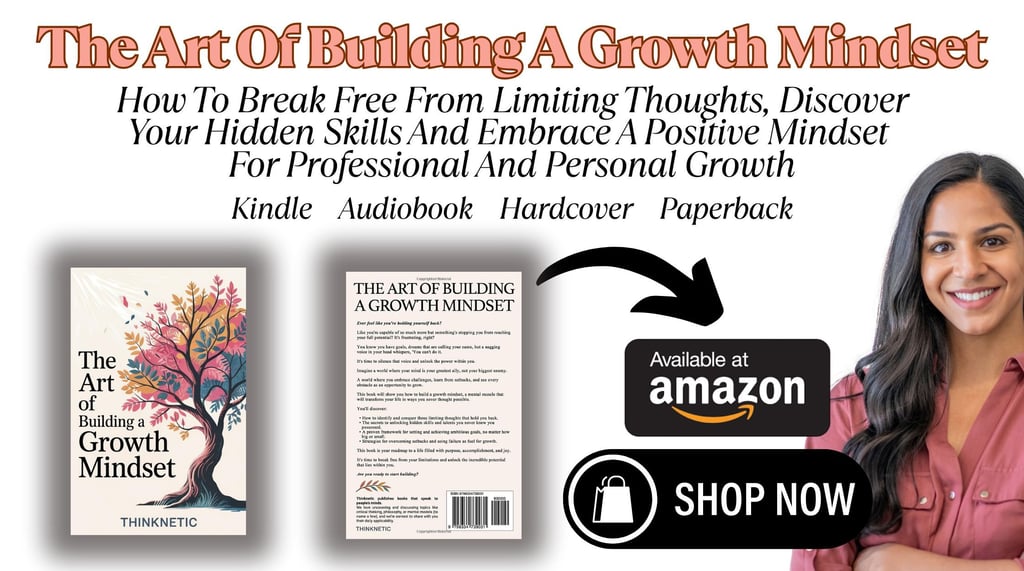Mindset Shifts for Women: Simple Changes That Spark Real Life Transformation
Mindset shifts can reshape your outlook. Explore easy changes for women that inspire growth, happiness, and genuine transformation in everyday life.
SELF CARE AND PERSONAL GROWTH
Shari Smith
6/22/202512 min read
As an Amazon affiliate, we earn commissions at no extra cost to you if you click our links and make a purchase.


Sometimes, the difference between feeling stuck and seeing new possibilities starts with a shift in mindset.
For women, these changes can help break old patterns and bring fresh energy into everyday life.
Mindset shifts aren’t just about thinking positive thoughts—they’re about changing the way you see challenges, habits, and your own potential.
When you invite a new perspective in, you open the door to growth that lasts.
In this post, you'll discover mindset shifts that spark real transformation. They’re practical, gentle, and ready to fit into your daily routine.
If you’re curious about what’s next and want to step forward with more confidence, you’re in the right place.
The Power of Mindset Shifts: Redefining Success and Failure
Changing how you see success and failure can guide you to a kinder, more flexible view of yourself.
Mindset shifts here aren’t just buzzwords, they are gentle invitations to relate to your goals and setbacks with more warmth and less pressure.
Many women feel weighed down by old stories about what it means to succeed or fail.
Here’s how subtle shifts in mindset can open the door to more courage, joy, and real progress.



6 Powerful Mindset Shifts
That Will Change Your Life
Watch Video...
Letting Go of Perfectionism
Perfectionism quietly steals joy. It can keep you stuck, waiting until everything feels “just right” before you try anything new.
If you’ve ever found yourself hesitating, worried your results won’t be good enough, you know this feeling well.
Try swapping perfection for progress. You don’t have to do everything perfectly to make it count.
Give yourself permission to try, even if the outcome looks a little messy. Life is full of small wins, half-finished projects, and experiments that didn’t turn out as you planned.
Each one means you dared to begin.
Here are simple reminders for letting go of perfectionism:
Done is often better than perfect.
Mistakes are part of learning, not signs of failure.
It’s okay to show up as yourself, even on tough days.
The more you practice, the lighter your spirit feels.
Reframing Failure as Feedback
Failure is a word that brings a sting, but it can also be a teacher.
Instead of seeing a setback as evidence that you’re not cut out for something, see it as a signpost. Every missed mark holds lessons that help you grow stronger and wiser.
When you try something and it doesn’t go your way, ask yourself:
What can I learn from this?
Did anything go well, even in a small way?
What would I do differently next time?
Adopting these mindset shifts means you stop fearing failure and start using it.
This approach helps you step forward with less fear, because you know you’ll gain something valuable either way.
Celebrating Progress, Not Just Outcomes
So much focus goes to the finish line, but real change happens in the steps no one else sees. If you only celebrate big goals, you miss out on the everyday triumphs.
Take a moment to notice when you stick to a habit, show up for yourself, or simply keep going on a hard day.
These are the things that shape who you are and move you forward, little by little.
Try keeping a small list or journal entry each day about:
One thing you did today that made you proud.
A moment when you kept going, even if it felt small.
Something you’re learning right now, no matter the pace.
Mindset shifts like these help you stay motivated and lighthearted, especially when the end result feels far away.
Recognize every bit of progress, and you’ll fuel steady change that lasts.
Building Self-Compassion and Inner Confidence
Small mindset shifts can have a gentle but powerful effect on how you see yourself every day.
For many women, feeling good on the inside often starts with kindness toward yourself and a bit more trust in your own voice.
It’s not about faking confidence or ignoring flaws—it’s about treating yourself like a friend and learning to stand by your own side, even on hard days.
This section is all about simple ways to invite more self-compassion and build a steady sense of confidence from within.


Silencing the Inner Critic
We all have that nagging voice inside that speaks up when things go wrong.
Sometimes it shouts; sometimes it whispers you’re not enough. Left unchecked, it can color how you see every part of your life.
You can shift your mindset and soften that inner critic.
Try this:
Catch the critical thoughts early. Name them so they lose their strength.
Ask yourself: Would I say this to a close friend? If not, pause and reframe.
Replace harsh words with gentle ones, even if it feels awkward at first.
Remember mistakes are part of learning, not proof that you’re failing.
Picture the inner critic as an old car alarm that goes off for no reason. You don’t have to listen every time it starts up.
Bringing awareness to this voice, and then choosing not to believe it, is a kind of power.
Practicing Positive Self-Talk
The words you use with yourself shape how you feel and what you try next.
Positive self-talk isn’t about ignoring hard truths or painting over flaws. It’s about choosing language that supports growth and hope.
Here are a few ways to practice using more supportive words with yourself:
Start your day with a simple affirmation like, “I’m allowed to take up space.”
When you feel anxious or doubtful, try this: Stop, take a breath, and say, “I’m figuring this out.”
Write encouraging notes to yourself, even if you need to stick them on your bathroom mirror.
Try seeing positive self-talk as a daily exercise, just like stretching in the morning. Over time, it gets easier and you start noticing that inner warmth grows.
Setting Boundaries Without Guilt
Setting boundaries can feel hard, especially if you’re used to putting others first. Many women carry guilt for saying “no,” even when it’s what they need.
The right mindset shifts can help you see boundaries as an act of self-care, not selfishness.
Think of boundaries as invisible fences that protect your energy and help you show up your best.
Here's how to start:
Notice where you often feel drained or resentful. These are usually spots that need a bit more space.
Practice saying “I can’t take that on right now” or “Let me get back to you.” Simple statements help create healthy limits.
Remind yourself that your needs matter just as much as anyone else’s.
You can’t pour from an empty cup. Protecting your time and energy makes kindness sustainable, both for yourself and for those around you.
Building self-compassion and strengthening your confidence isn’t a one-time thing; it’s a gentle process of choosing yourself, day after day.
These mindset shifts are your permission slip to begin.
Shifting from Scarcity to Abundance Thinking
Sometimes, it can feel like life is a fixed pie, where every slice someone else gets means less for you.
This mindset can show up at work, at home, and even in friendships.
The scarcity mindset can leave you anxious, always looking at what’s missing or what you might lose.
But shifting to abundance thinking invites more freedom, space, and possibility.
When you practice these mindset shifts, you start believing there’s enough success, love, and happiness to go around.
Here are a few ways to get started.


Overcoming Comparison Traps
Comparing yourself to others happens more often than we care to admit. Social media, office chatter, or even family gatherings can turn someone else’s win into a reason you doubt your own worth.
Instead of seeing another woman’s achievements as a threat, try picturing them as proof of what’s possible.
To break the cycle of comparison:
Mute or unfollow accounts that make you feel “less than.”
List three things you appreciate about your own progress, no matter the pace.
When someone else does well, say “good for her”—and truly mean it.
This small shift protects your energy and reminds you that everyone’s journey is different.
When you let go of the urge to compare, you make space for community, connection, and genuine support.
Recognizing and Celebrating Your Strengths
Scarcity thinking hides your strengths behind self-doubt or false modesty. It’s easy to overlook what you do well when you’re focused on gaps or what you wish you could change.
Practice spotting your natural abilities and celebrating them.
You can:
Write down small wins at the end of the week.
Ask a close friend what strengths they see in you (it’s often eye-opening).
Keep a “smile file” of kind messages, thank you notes, or reminders of moments when you felt proud.
Your skills, kindness, and creativity are not running out. The more you notice and value them, the more confidence you build.
Embracing Opportunities for Growth
Abundance thinking isn’t only about believing there’s enough for everyone.
It’s also about trusting that opportunities will keep coming, and that each experience can lead to something new.
When you look at challenges as open doors (even if they seem small or uncertain), your mindset shifts in a powerful way.
Try these ideas:
Say “yes” to one thing a week that scares or excites you, even just a little.
Remind yourself, “I can learn as I go,” instead of waiting until you feel completely ready.
Reflect on past times when a challenge led to unexpected benefits or growth.
Believing that there’s room for you and that you can always grow takes you out of stuck thinking and into a place where more feels possible.
These mindset shifts help plant seeds for future joy and success, no matter where you are today.
Embodying Resilience and Adaptability
When things don’t go as planned, the way you respond shapes your path forward.
Mindset shifts that help you bounce back and adjust to new situations can become your secret superpower.
Let’s look at how you can meet life’s twists and turns with steady confidence—no matter how small or messy the moment feels.


Turning Setbacks into Setups
Everyone faces letdowns or unexpected turns.
These moments can sting, but they don’t have to hold you back. Instead of seeing setbacks as a stop sign, try looking at them as a new starting line.
Ask yourself: What is this teaching me? Often, a closed door points you toward something better, even if you can’t see it yet.
Here’s how to turn a setback into a setup for growth:
Pause and reflect: Give yourself a day or two to feel the disappointment, but then start looking for possible next steps.
Focus on what you can control: Put your energy into small, doable actions.
Celebrate your effort: Even if things didn’t go as planned, showing up and trying matters.
A mindset shift like this doesn’t erase hard feelings, but it makes space for hope and motivation to return. Think of setbacks as surprise detours, not dead ends.
Adopting a Solution-Oriented Mindset
When a problem pops up, it’s easy to pause, worry, or go over the worst-case scenarios in your mind. But imagine flipping the switch: what if the problem is a puzzle to solve instead of proof of failure?
Having a solution-oriented mindset means you look for actions, not just answers.
Every time you catch yourself ruminating, try to nudge your thoughts toward what you can do, even if it’s tiny.
To get started, try these steps:
Identify the problem clearly: Name what’s really going on.
Brainstorm possible solutions: No idea is too small or silly at first.
Take one small action: Focus on progress, not perfection.
This approach takes the pressure off having every answer right away. It can turn overwhelm into a series of small moves, each building your confidence.
Welcoming Change as a Path to Self-Discovery
Change can feel tough, especially if it sneaks up on you or isn’t what you wanted. But every experience, even the ones you didn’t ask for, can show you something new about yourself.
When things shift, treat it as an invitation to get curious. What skills are you learning? What matters more—or less—now? Each change, big or small, shapes you into someone a little more flexible and wise.
Here are gentle ways to welcome change:
Stay open to new routines: Let yourself try new ways, even if they feel awkward at first.
Ask “what am I learning about myself?”: Each season, job, or relationship can teach you something unexpected.
Share your story: Talking with friends or journaling can turn big changes into lessons you’ll carry forward.
When you see change as a way to learn more about who you are, hard times start to feel less scary and more like chapters in a story.
Mindset shifts like these help you stay grounded, even as life keeps moving.
Cultivating a Growth Mindset for Lifelong Empowerment
Bringing a growth mindset into your everyday life is like planting seeds that keep on giving.
Instead of seeing your skills or personality as fixed, you begin to treat every experience as a chance to stretch and see what’s possible.
This section shares simple, practical mindset shifts for women who want lasting, joyful change both at home and beyond.


Viewing Challenges as Opportunities
Big or small, challenges have a way of showing up just when you’re getting comfortable. Instead of shrinking from them, try seeing each one as a door to new skills and self-understanding.
With a growth mindset, mistakes are no longer the enemy; they become teachers.
Practice curiosity, not self-criticism: When something feels hard, ask what you can try differently next time.
Reframe setbacks: Start to think of each “failure” as feedback, not a final grade.
Celebrate effort over outcome: Notice and reward the steps you take, even when things get bumpy.
Think of life like a cozy, sometimes messy kitchen. Sometimes the soufflé flops. Other times, surprising flavors come out.
Either way, you keep learning and growing with each try.
Seeking Feedback and Learning from Others
No one does it all on their own. Welcoming feedback and listening to others can be scary, but it’s also one of the fastest tracks to growth.
With a growth mindset, you treat every conversation and correction as a chance to see yourself through fresh eyes.
Here’s how to welcome more learning into your routine:
Ask open questions: “What’s one thing I could do better next time?”
Find growth-minded friends: Surround yourself with people who cheer you on and tell you what’s real, not just what’s easy to hear.
Notice what inspires you: Watch how others tackle challenges, express ideas, or recover from stumbles—and try on what works for you.
Feedback isn’t a sign that you’re lacking. It’s more like a guidebook, helping you find shortcuts you might have missed on your own.
Creating Rituals for Ongoing Mindset Shifts
Building a growth mindset isn’t a once-and-done job. It’s more like tending a houseplant: regular water, a little sunlight, the occasional pep talk.
Rituals help remind you that learning and growing are lifelong habits, not just a phase.
Here are some gentle, daily rituals you can try:
Morning check-ins: Start your day by asking, “What’s one thing I’ll try to do differently today?”
Reflective journaling: In the evening, jot down one new thing you learned or a way you bounced back from a hiccup.
Weekly self-celebrations: Share your wins—big or small—with a group chat or a close friend.
Rituals anchor growth. Even five quiet minutes can set the tone for your day.
With steady practice, these mindset shifts become part of who you are: open, curious, and always ready for what’s next.
Building a growth mindset invites lifelong empowerment, making every season—calm or stormy—a little more full of hope and possibility.
Conclusion
Small mindset shifts often spark the biggest changes. Letting go of perfection, seeing failure as feedback, and focusing on progress nudge you toward a more joyful, forgiving way of living.
Building self-compassion and shifting from scarcity to abundance unlock deeper confidence and genuine connection.
When you welcome change and see challenges as moments to grow, daily life starts to feel lighter and more possible.
Start weaving these mindset shifts into your daily routine and watch your story grow in fresh, meaningful directions.
No need for sweeping changes—tiny steps carry you forward. If you’re ready to try something new, pick one shift and begin today. You might surprise yourself with how much opens up.
Thank you for spending time here. What’s one mindset shift you want to bring into tomorrow?
Add your thoughts below or share with a friend who could use this gentle reminder. Real change starts with the way you see yourself—keep going, you’re on the right track.






